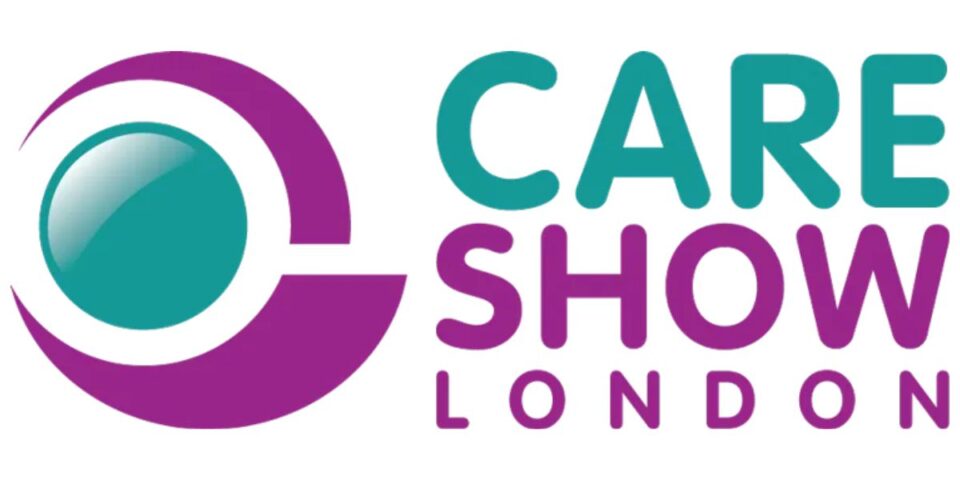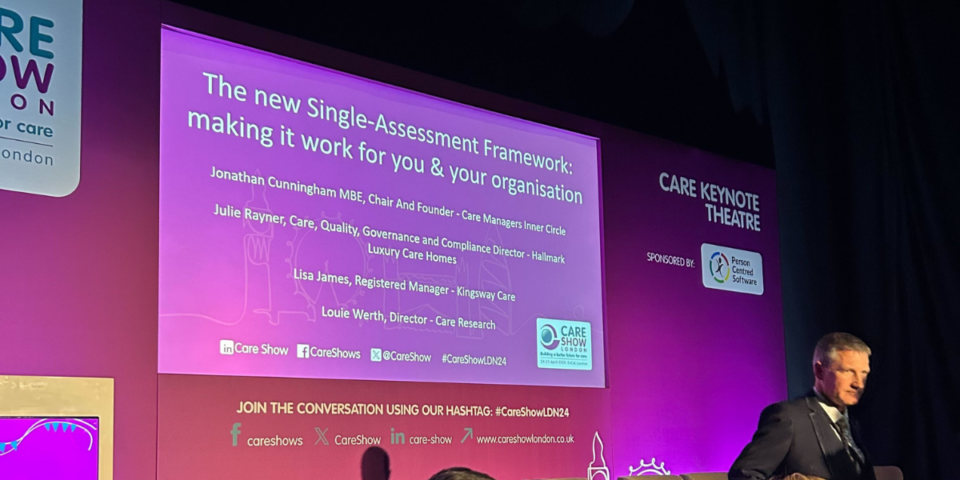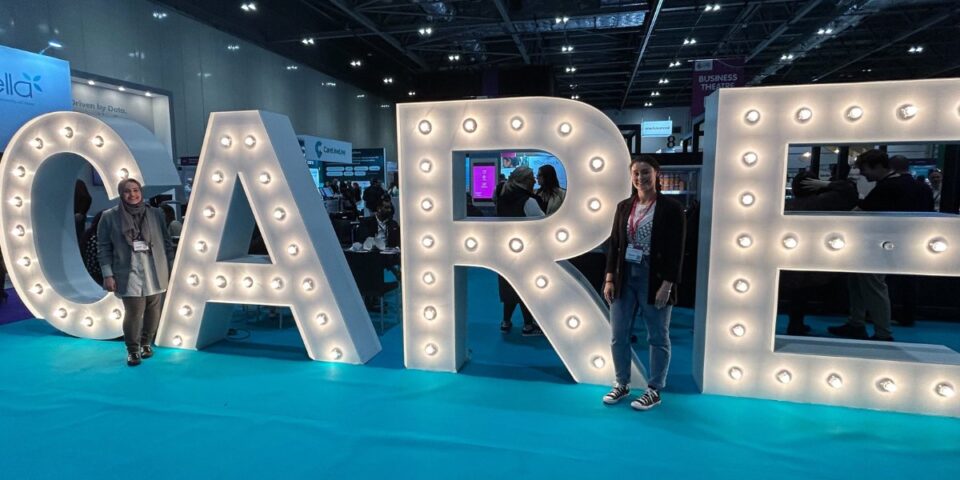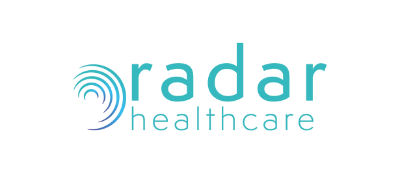Insights from the Care Show London and Digital Healthcare Show 2024
30 April 2024
Tags:
Harnessing Insights: Highlights from Care Show London & Digital Healthcare Show 2024
Our recent attendance at the Care Show London and Digital Healthcare Show 2024 was a truly enriching experience, with two days of insightful sessions and illuminating presentations, critical themes emerged, ranging from patient safety and feedback to AI integration, interoperability, and staff wellbeing.
Moreover, the significant presence of Tech Providers underscored their pivotal role in offering solutions that facilitate the delivery of high-quality care, a recurring theme throughout the discussion.
Without delay, let’s dive into dissecting the sessions and unraveling the key messages and themes emerging from both events…

Embracing Technology in Care Provision
A key theme to come out of both the Care Show London and the Digital Healthcare Show was technology’s part in enhancing care provision.
Industry experts illuminated how technology serves as more than a tool for time management—it’s a catalyst for enhancing staff wellbeing and professional development. Yes, technology can help staff to have more time to care for residents, but a recurring theme was that of allowing staff more time for themselves to help reduce burnout and improve retention rate, and, in turn, increase care quality.
The term ‘Digital Natives’ is a new buzz word to enter the industry, meaning people who grew up around technology and are therefore quicker to adapt to new technologies. It is key to utilise these people to help upskill and train your workforce.
Our CEO, Paul Johnson, led a session on Global Healthcare Innovation, providing a panoramic view of emerging trends, emphasising themes such as high reliability, AI integration, and burnout prevention. These insights underscored the importance of leveraging technology to enhance patient outcomes and staff wellbeing.
In addition to time saving benefits, the event highlighted the benefits of technology for driving sustainability and efficiency. Jay Dodhia, Director and Co-Founder, Serene Care, Nathan Teed, BDM, Capita Public Service, Rishi Jawaheer, Director, Care Vision, and Adam Abrahami, CEO and Founder, H2o Networks, led a captivating session on how by leveraging technology, such as sensors you can gather data and optimise resource allocation, reducing cost.
Overall, most sessions landed on the conclusion that technology is a positive thing, but any systems that organisations implement MUST help you provide great care.

Mastering CQC-Ready Feedback Processes
As expected CQC was a very prevalent theme across the two days. We heard top tips, opinions, and best practice from a range of experts, including Jonathan Cunningham MBE, Chair and Founder, Managers’ Inner Circle, Lisa James, Registered Manager, Kingsway Care, Julie Rayner, Care, Quality, Governance and Compliance Director, Hallmark Luxury Care Homes, and Louie Werth, Director, Care Research.
Louie Werth’s session on mastering CQC-ready feedback underscored the pivotal role of feedback in the new CQC framework. Integrating feedback seamlessly into organisational processes is essential for achieving and maintaining high ratings.

But why does feedback matter? Aside from the obvious reasons of it helps you to grow and improve your organisation, the new framework puts feedback front and center, meaning a large volume of feedback is required to obtain a good or outstanding rating.
Sessions highlighted that for a Care Home or Supported Living 61% of all evidence gathered is feedback related, and in Homecare it is 68%!
Insights from the sessions highlighted the need for dynamic, current feedback processes aligned with the CQC framework. And as Louie says, “The new framework is like tapas, small bits over a period of time”. Therefore, there needs to be a process in place to consistently gather a whole heap of current feedback from a range of stakeholders to prove to the CQC that you are providing good quality care and/or making improvements where necessary continuously.
CQC key takeaways
📝Feedback over a year old is out of date. Have relevant and current feedback that you can cross reference and organise against the individual quality statements and the CQC framework
🗳 Set up a process to collect feedback continuously
💬 Introduce the CQC’s language into your day-to-day processes to prepare stakeholders for an inspection
💡 Prepare your staff for CQC interviews. There are lots of great resources available, for example, Louie’s team at Care Research have recently created a great bitesize learning tool called “Care Staff Confidence: How to speak to a CQC inspector”
The Importance of Integration between Social Care and the NHS
Integration and interoperability were two other key buzz words from the event. Nick Goodall’s, Senior Program Manager, NHS England, session emphasised the urgency of improving communication between health and social care sectors to enhance patient support. By adopting digital solutions, organisations can bridge the gap between disparate systems and streamline information exchange.
As Nick emphasised that, “People don’t care if it’s a green or blue badge that they are being treated by, they just want good quality care and to feel supported” making it even more essential that NHS and social care are aligned.

It is apparent that all organisations use different systems based on preferences and business objectives, making it essential to adopt systems that can connect and talk to each other to reduce duplications, errors, and digital fatigue.
Overall, the session highlighted that the tech that has the biggest impact in the industry is the ones that directly impact the industry, for example targeting key issues like reducing burden, freeing up more time, increasing retention, etc.
For more information, the Digitalising Social Care Programme helps adult social care providers with resources, support and best practices in adopting the right technology that supports them to transform how they provide care.
Leveraging Social Media
We attended a great session hosted by Amy Dobson, Social Media Manager, Hallmark Luxury Care Homes, Nick Silverstone, Managing Director, Wagada Digital, and Ben Miller, Registered Manager, Milkwood Care, who explored the power of social media as a strategic tool for engaging stakeholders, recruiting talent, and showcasing organisational values.
They emphasised the importance of authenticity and storytelling in effectively connecting with audiences.
Top social media tips include:
💕 Leveraging emotion: people make decisions based on emotion, utilise this to make connections, relationships and build your brand.
📈 Ask yourself an important question: What are you trying to achieve? And set goals short- and long-term goals.
💬 Understand your target audience: Take a step back and look at your social media, and ask: does it resonate with your target audience?

AI – the challenges and opportunities
Artificial Intelligence (AI) in health and social care presents a mixed bag of opportunities and challenges. While AI has the potential to streamline processes and improve decision-making, its implementation lacks clear legislative frameworks, requiring comprehensive training for proper use. However, the misuse of AI, like using ChatGPT for care plans, raises concerns about data privacy and regulatory compliance.
During discussions led by industry experts, Alex Plenty, Senior Technical Advisor – PredicAire, Rob Hammond, Managing Director, Eastern Care Management Solutions, Vinay Patel, Managing Director, KRG Healthcare, and Mark Topps, Co-Founder and Director, The Caring View, questions arose about AI’s ability to provide a person-centered approach, with consensus that while AI can assist, it cannot replace human empathy. Nonetheless, there is optimism about AI’s potential to address loneliness and enhance quality of life.
Key considerations include using intent and prompts effectively and addressing the lack of formal AI training. Organisations are urged to develop robust AI policies, foster curiosity, and recognise AI as a tool for improving care delivery.
Avoiding Digital Fatigue
The shift towards digitalisation was evident, especially in a room filled with technology providers. Rishi Jawaheer’s, Director of Care Vision, session on “digital fatigue” highlighted the challenges of transitioning to digital systems, emphasising the importance of choosing the right system and prioritising interoperability.
Efficiency and GDPR compliance were key themes in navigating this transition effectively. Health and social care workers encounter difficulties adapting to digital systems, potentially exacerbating existing issues. It’s crucial to select integrated systems that cover multiple aspects of care delivery to avoid “firefighting”, emphasising long-term solutions over short-term fixes is essential to avoid ongoing challenges.
Interoperable and all-in-one systems offer solutions to mitigate digital fatigue, reduce duplication, simplify staff training, and ensure compliance with GDPR and regulatory standards
Fostering Patient Safety
Across the two days, it became clear that technology plays a vital role in fostering a culture of sharing and learning around health and social care – and this is especially true with patient safety and care quality.
Patient Safety Learning’s platform is recognised for its excellence in sharing knowledge on patient safety. It provides a comprehensive suite of tools, resources, case studies, and best practices to support those striving to improve patient care. Through its communities of interest, individuals can engage in discussions about patient safety challenges and solutions. Membership is free, and registration is available at www.pslhub.org.
The world’s first set of patient safety standards: How Patient Safety Learning has created a self-assessment platform to help healthcare organisations on their journey to providing safer care, presented by Clive Flashman, Chief Digital Officer – Patient Safety Learning and Helen Hughes, Chief Executive – Patient Safety Learning, offered oversight of their new online patient safety assessment toolkit, an easy-to-use resource created to significantly contribute to organisational excellence.
And that’s a wrap!
The Care Show London and Digital Healthcare Show 2024 served as a catalyst for dialogue and collaboration, addressing critical challenges and opportunities in care provision. Each segment offered invaluable insights, highlighting the multifaceted approach required to deliver quality care in today’s evolving healthcare landscape.
Radar Healthcare remains committed to driving innovation and fostering partnerships that advance the standard of care delivery, in alignment with the evolving needs of the healthcare sector.
We had a fantastic time over the two days. Thank you to everyone who made it such a successful event!







